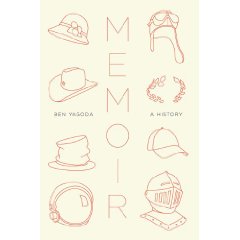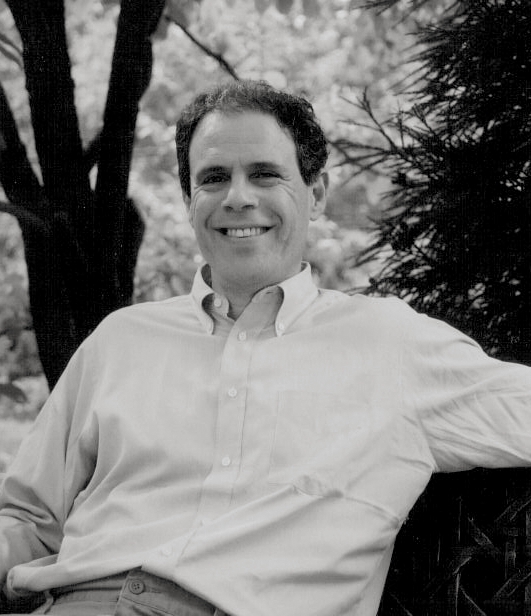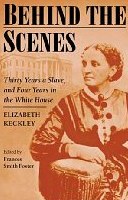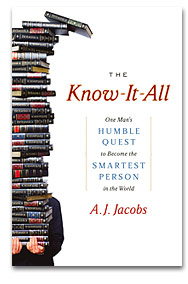I Swear It Happened Just Like This: An Interview with Ben Yagoda, author of Memoir: A History
Friday, December 11th, 2009
“It’s unavoidable that the truth is subjective: a book might be true enough for you and not true enough for me.”
In his chronicle of the form, Memoir: a History, Ben Yagoda explains that the term memoir can be traced back to 1678. But the notion of being fascinated with our own and others’ lives actually goes back even further, to the development of glass mirrors at the end of the 15th century. We’ve been staring into that mirror ever since, a pastime that provides endless occupation for my two cats, millions of bloggers, and a handful of successful authors who pigpile the bestseller lists week after week.
 Memoir: A History is author and University of Delaware English professor Yagoda’s audacious attempt to tell the story of what is now far and away the world’s most popular form of nonfiction writing. It’s a story that spans thousands of memoirs and hundreds of years. His account is intensely dense with information, and often playfully opinionated about the form’s evolution and those who have changed its journey—and manna for those of us obsessed by personal storytelling.
Memoir: A History is author and University of Delaware English professor Yagoda’s audacious attempt to tell the story of what is now far and away the world’s most popular form of nonfiction writing. It’s a story that spans thousands of memoirs and hundreds of years. His account is intensely dense with information, and often playfully opinionated about the form’s evolution and those who have changed its journey—and manna for those of us obsessed by personal storytelling.
Much of the book deals with scandals and questions of “truthfulness”—the very questions that have dominated the conversation about memoir in recent years. Yagoda shows how these same questions of authenticity and deception are nothing new. James Frey may have been the first in a recent line of dominoes of discredited memoirists, but all the way back in 1718, Daniel Defoe’s Robinson Crusoe was attacked as a fake memoir (even though, unlike Frey, Augusten Burroughs, and Margaret B. Jones, among others, Defoe labeled it as fiction). While we wait for the ink to dry on the Tiger tell-all book contract that surely must exist already, Yagoda recalls the celebrated British Regency courtesan Harriette Wilson, who in 1825 charged some of her patrons 200 pounds not to include their names in her books. Without Elizabeth Hobbs Keckley’s Behind the Scenes; Or, Thirty Years as a Slave, and Four Years in the White House (1868), which tells of her time in Mary Todd Lincoln’s employ, we might not ever have heard from Scott McClellan on the Bush years, or, for that matter, The Devil Wears Prada. On a lighter note, Yadoga connects the dots that link first-person humorists Mark Twain, James Thurber, and David Sedaris.
I talked with Ben Yagoda by phone at his home in Swarthmore, PA, about his own journey researching and writing Memoir: A History; his impeccable taste in some of our more modern forms of memoir; and why a two-part, 12-volume book by a French philosopher written in 1789 may be the greatest story ever told. —Larry Smith
 You cover quite a bit of ground in your 2,000-year history of the memoir, which you explain goes back to Julius Caesar. How many memoirs have you read? How does one begin?
You cover quite a bit of ground in your 2,000-year history of the memoir, which you explain goes back to Julius Caesar. How many memoirs have you read? How does one begin?
Depends what you mean by “read.” I’ve read all, or the majority, of around 700 or so. How many memoirs have been written? Tens of thousands? Scores of thousands? And how could one attempt to read them all to write a book about it? The mind boggles. My strategy was first go to the secondary sources about memoir, such as catalogs of memoirs, and then read the ones that are obviously important, whether it’s Jean-Jacques Rousseau or Benjamin Franklin or James Frey.  Then I did triage based on what I’ve read or heard from other people, and read the ones that are important and/or great and/or told an interesting story. For example, Elizabeth Hobbs Keckley’s memoir, Behind the Scenes, about Mary Todd Lincoln, was fascinating in how it dealt with race. But it was also one of the first memoirs in which the author wrote negatively and extensively about a prominent living person—something that, of course, is completely common today.
Then I did triage based on what I’ve read or heard from other people, and read the ones that are important and/or great and/or told an interesting story. For example, Elizabeth Hobbs Keckley’s memoir, Behind the Scenes, about Mary Todd Lincoln, was fascinating in how it dealt with race. But it was also one of the first memoirs in which the author wrote negatively and extensively about a prominent living person—something that, of course, is completely common today.
What’s the greatest memoir ever written?
If I were forced to choose, I would say Jean-Jacques Rousseau’s The Confessions is the greatest. It’s a document that you pick up and can’t believe he’s so audacious and modern and loony and frank and racy. And there’s no dialogue in what’s a 650-page memoir.
Why is the lack of dialogue important?
I’m putting together a visual chart of the “truthy” nature of memoirs. One of the metrics on the matrix is a point system. I subtract points for bad writing. When people think and write in clichés and lazy and incomprehensible language, that tells me something about how they’ve addressed issues of accuracy and truthfulness. The worse the cliché, the more I don’t trust the author. Another metric is the amount of dialogue in a memoir. Today, it’s understood that you have to have dialogue in scenes; it’s just what people expect. Yet the more you do that, the less literally “truthful” it is, because no one can remember dialogue and, to a lesser extent, remember scenes.
You begin the book with a fairly cheeky chapter about the state of the memoir today. Yet by the end you say the form is a “net boon” for the cause of writing. How do you really feel?
The title of the opening chapter is “Memoir Nation Universe.” It struck me that the way to get into this topic was to address the idea: “Is everybody writing a memoir?” I don’t  want to come off too cynical, but I felt a way into the book was, to some extent, to make fun of the sheer profusion of memoirs—the subgenre of one dog memoir begetting more dog memoirs, and one guy reading the Encyclopedia Britannica begetting a memoir of someone else reading the OED. I wanted to have a little fun with the volume and variety of these books before getting into the extensive and wide-ranging history that begins the next chapter.
want to come off too cynical, but I felt a way into the book was, to some extent, to make fun of the sheer profusion of memoirs—the subgenre of one dog memoir begetting more dog memoirs, and one guy reading the Encyclopedia Britannica begetting a memoir of someone else reading the OED. I wanted to have a little fun with the volume and variety of these books before getting into the extensive and wide-ranging history that begins the next chapter.
I was excited to see Six-Word Memoirs included in this history. But I was also surprised that you don’t address blogging much.
The SMITH site and Six-Word Memoirs, as well as projects like Postsecret, are definitely examples of the pervasiveness of the memoir idea in various realms of the culture. But I knew I had to focus, focus, focus while writing Memoir, and my focus was on books.
Also, deep down I’m not sure if I associate blogs with memoirs. I like good writing. I like wit. And you find that in blogs. But blogging—which I do myself—is something else, a practice I associate more with traditional diaries and journals. In the task of corralling all that material into a book, it was useful for me to make separations, and a diary/journal/blog is not a memoir; it’s an ongoing thing: This is what happened today, this hour. Whereas a book is sitting down and telling your whole life, or a significant segment of your life. It has that recollected-in-tranquility quality necessary for making a book-length object out of raw experience.
Elie Wiesel said he needed at least 10 years to have the distance and tools to write about the Holocaust. Do you think we have the patience to wait for historical perspective in the age of blogs and stories doled out 140 characters at a time, and then often turned into quickly produced books?
I’m not sure if I know the answer to that question. Stories want to be told. In fact, some of these recent historical events—Katrina, the Iraq War—have indeed been well covered by memoir. In terms of books, I think there is, and will continue to be, a desire by talented writers to write books on things they experienced or reported on, and those books will be published. There are a lot of mediocre and worse books that are published in every genre. If trends are such that fewer of those books are published, then that’s a good thing.
In her review in The New York Times, Judith Shulevitz said she wished you had answered the question as to whether it matters if a memoir is true or false as long as it entertains us. So now’s your chance.
I thought I addressed that question, or at least tried to. And the answer is certainly yes. It does matter. That’s why they’re called memoirs. A large reason why people respond to them is because they’re understood to be true. The more difficult question is, What is the meaning of true? It’s a complicated question, and the genesis of the book. My editor, Geoff Kloske, stated that this was the James Frey era. Geoff felt that the majority of the articles and statements around the Frey issue were simplistic. Either everything must be fact-checked, every word must be true; or, on the other hand, some of the memoirists saying, “Well, it’s a memoir, it’s my truth, I can put what I want in the there.”
The answer lies in the middle. Yes, we understand that something in a memoir or any book of nonfiction can’t be 100-percent true—it’s a convenient fiction that anything can be. But it should be true to a certain level. And that level is what I attempt to talk about in the book. At the same time, it’s unavoidable that that truth is subjective: A book might be true enough for you and not true enough for me.
In the last chapter, I quote a New York Times reporter named Raymond Walters who, in 1960, wrote what I think is the wisest statement about the memoir. He says that as a reader, you have to stand there as if you’re just being introduced to the author and then ask yourself: Do you believe this person? That requires you to make some judgments and exercise some taste on your part.
Why do we love these books as much as we do?
The simple answer is that we love stories. That’s hard-wired. That writing-class cliché, “Write about what you know,“ works because when you write about what you know, you tell a strong story, have a strong writing style—you’re authoritative and not pussyfooting around, and not trying make stuff up, which gets most of us into trouble.  Someone who is a good, insightful writer and a good storyteller and understands the language and understands the craft of writing—and better yet, if they’ve had unusual or interesting or dramatic experience, or if they go out and read the encyclopedia like A.J. Jacobs did—that’s a recipe for a good book.
Someone who is a good, insightful writer and a good storyteller and understands the language and understands the craft of writing—and better yet, if they’ve had unusual or interesting or dramatic experience, or if they go out and read the encyclopedia like A.J. Jacobs did—that’s a recipe for a good book.
What three books should every budding memoirist read?
The first one that comes to mind is This Boy’s Life—because of the craft of it and the presentation of [author] Tobias Wolff as a character is absolutely “Rouseauvian,” if that’s a word. He casts such a cold eye on himself. And that’s just so important for a writer to get the reader on your side. It also shows the reader in a different way that you have really thought about yourself and this experience. You’re not just meeting someone at a party and blathering on about what happened to them yesterday and how they had a terrible experience. This Boy’s Life is really well considered.
Two other memoirs I would recommend are Ruth Reichl’s Tender at the Bone and J.R. Moehringer’s The Tender Bar, which, despite having similar names, are very different and will show you different things. Reichl has a simple, unadorned, straightforward style. Moehringer’s is more literary and rich, and his whole book has the feel of something that was reflected and worked on for many years.
And now J.R. Moehringer has ghostwritten Andre Agassi’s memoir, which has received critical acclaim and cruised to the top of the bestseller list.
I read a good deal of the Agassi book sitting in a bookstore. Not surprisingly, it struck me as really well written, and, maybe more surprisingly, it sounded to me like Agassi, not some ventriloquist. But the literary ghost, like everything else, isn’t new. Mark Twain was thought to have ghosted Grant’s memoirs, but that actually doesn’t seem to be true. More recently, James Kaplan, a literary-ish writer, did McEnroe’s memoir, and Ron Powers did Ted Kennedy’s.
You mention Dave Eggers’s A Heartbreaking Work of Staggering Genius as a breakthrough memoir in the last decade. What’s a fresh addition to the form lately?
What comes to mind is not one book but the genre of the graphic memoir—following Harvey Pekar’s and Art Spiegelman’s lead, books by writers such as Allison Bechdel (Fun Home) and Laurie Sandell (The Impostor’s Daughter), Marjorie Satrapi, who did Persepolis, and very recently is David Small’s Stitches [read an interview with Small on SMITH]. It’s an exciting innovation, though I fear it will get overdone.
What advice do you give a first-time author like my wife, for example, upon the release of her memoir, as she freaks out that she’s about to put the details of her life out there and be judged by an unforgiving public?
You just put it perfectly: You will be judged. And that’s appropriate, as that’s what you’re putting forward: Yourself. If it’s a novel, you’re being judged as a writer, but the story is not you. In a memoir, everything is you. So be prepared to be judged and know what you’re getting it into. I don’t think I could ever do it.
And finally, Ben Yagoda, what’s your Six-Word Memoir?
Used to shop in husky section.
++++
BUY Memoir: A History by Ben Yagoda.
VISIT Ben Yagoda’s web site.
SEE Ben Yagoda read on January 6 at the Cornelia Street Café, as part of the Freerange Nonfiction Reading Series.






Pretty good post. I just came across your blog and wanted to say that I have really enjoyed browsing your blog posts. Any way I’ll be subscribing to your blog and I hope you post again soon!
Hey there, I think your site might be having browser compatibility issues. When I look at your blog in Opera, it looks fine but when opening in Internet Explorer, it has some overlapping. I just wanted to give you a quick heads up! Other then that, fantastic blog!
nike free selbst entwerfen bei nike http://www.simonsindustrial.com/?keyword=nike-free-selbst-entwerfen-bei-nike&id=2753
I’m learning to write memoirs, and Ben Yagoda was one of my teachers in writing memoirs, writing his highly detailed and discard things that are not important is the strength of Ben Yagoda.
I’m learning to write memoirs, and Ben Yagoda was one of my teachers in writing memoirs, writing his highly detailed and discard things that are not important is the strength of Ben Yagoda. jelly gamat gold g
Over-estimate the repair that needs to be done to cover yourself if any repairs are added later in the rehab.
It is easy to find asthere are many hard money lenders acrossthe country who are willing to help those in the flipping houses business succeed.
This has made it disadvantageous for foreign investors to
purchase commercial-mortgage backed securities tied to the prime rate,
as well as creating a more difficult environment for banks offering SBA loans.
Since the sub prime situation hit critical mass there has been a lot of interest in hard
money loans. Investors are becoming aware of this and we should see an inflow increase into these funds.
They ended up borrowing amounts they couldn’t afford to settle at rates which were far from line in doing what other subprime lenders were charging Jual Ps2 it isn’t just a cash advance lender who
can have bad practices.
Very soon this web page will be famous among all
blogging and site-building viewers, due to it’s fastidious posts
I’m extremely pleased to discover this great site. I need to to thank you for your time just for this wonderful read!!
I definitely loved every bit of it and I have you saved to fav to see new things on your web site.
There will be no indication to select the lock but pressing the activity button will certainly begin the lockpicking procedure.
This site was… how do I say it? Relevant!! Finally I have found something which helped me.
Appreciate it!
Asking questions are genuinely nice thing if you are
not understanding something totally, however this piece
of writing gives pleasant understanding even.
It’s an awesome paragraph designed for alll the web visitors; they will obtain benefit froom it I am sure.
http://obatalamipelangsing.com/produk-pelangsing-fiforlif/
If you are going for most excellent contents like I do, just go to see this site daily as it offers feature contents, thanks
http://foredistorebandung.blogspot.co.id/
sump pump denver…
Contract pro elkstone basements that’s available and ready to start and at the best price now only!…
te faire défoncer le cul. Eh, éh, éh. Moi C’est pas drôle Mais je peux en
Spot i’ll carry on with this write-up, I must say i think this fabulous website needs a great deal more consideration. I’ll more likely be once again you just read additional, many thanks for that information.
I do accept as true with all of the concepts you’ve introduced for your post. They’re very convincing and will definitely work. Nonetheless, the posts are very brief for newbies. Could you please lengthen them a little from subsequent time? Thanks for the post.
Thank you So much
I have to voice my Passion for your kindness giving support to those who should have advice on this important issue.
it is of course wise to always use recycled products because you can always help the environment,.
I keep listening to the reports talk about getting boundless online grant applications so I have been looking around for the best site to get one. Could you advise me please, where could i get some?
read…
Hire a top phoenix seo company that is now available in addition on sale now only!…